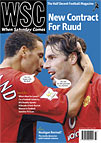 Michel Platini hopes to become FIFA president one day by campaigning against clubs' financial recklessness, explains Ben Lyttleton
Michel Platini hopes to become FIFA president one day by campaigning against clubs' financial recklessness, explains Ben Lyttleton
FIFA executive committee member Michel Platini has launched a one-man crusade to clean up football and vowed to punish clubs that consistently spend beyond their means. “Football is a game and I will do everything I can to defend it against businessmen,” said the former France midfielder and national-team coach. “Everything has been done to take away the real value of football. These days we’re always talking about the European Commission, G-14 and the Stock Exchange. Of course the game needs money, but money must never come before the game.”
Platini is also vice-president of the French football federation and was infuriated by cash-strapped Barcelona’s recent forays into the transfer market: last summer they bought Ronaldinho from Paris Saint-Germain and in January they signed Edgar Davids on loan from Juventus. “It’s outrageous that a club with massive debts like Barcelona can go and sign top players on big salaries. They took Ronaldinho from PSG when everyone knew the club was in financial ruins. The way things are going, the winners in this kind of football will be the club which carries out the most fraud.”
Platini fell into his political role after impressing Sepp Blatter when he was co-president of France’s 1998 World Cup organising committee. “Blatter then asked me to work with him and I helped get him elected by convincing some African countries who didn’t want to vote for him.”
He has turned his back on “millions of euros” to coach again and still retained the support of Blatter, which is why he is one of the favourites to replace the current incumbent when he stands down as FIFA president, it is envisaged, in 2010. Platini’s comments could have repercussions around Europe’s top clubs: for a start, he refuses to acknowledge the G-14 as a viable institution. “It’s not because they are the richest clubs that they can pretend to represent everybody – they are probably also the 14 most indebted clubs. They criticise UEFA, even though UEFA revised the Champions League to help them make more money. But they are so deep in debt that they’re up to their necks in it. What more do they want?”
Then there is the club versus country row over compensation for international tournaments. Platini’s stance? “The day the clubs take power there will be no more national teams, no more federations and no more development in football,” he said. “If they don’t want to pay for their international players, the simplest solution is simply not to recruit any.”
Platini wants to introduce a licence scheme that works in France, where a financial watchdog monitors each club’s accounts. If a club’s debts rise too high, that club is banned from participating in competitive games. “We can’t be running competitions with clubs who are millions in the red alongside others who run their affairs correctly. It’s cheating. And if that means kicking out Real Madrid or Barcelona, then so be it. We can’t allow clubs to get away with murder. A time will come when we have to stand firm.”
At the moment Platini is beating a lone drum. If he does replace Blatter as FIFA president, he is not worried about becoming less popular among the continent’s top brass. “I’ve always fought for football to be something clean and noble, but the game has become less and less so,” he continued. “There are others as well as me who are aware of the dangers but few of them want to fight to change things. But if I can contribute to re-establishing some real values in football, then I will continue and we will see where that will lead me.”
While fans may hope that Platini gets the power his views deserve, the man himself conceded that changing football’s current direction will not be easy. “If I can’t get my message over, then I will leave,” he said. “I’ll be off.”
From WSC 205 March 2004. What was happening this month